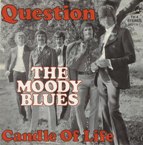Throughout the 80s and 90s, the Moody Blues were largely ignored by the press and they will forever be associated with their 1965 chart topper Go Now or the dreary Nights In White Satin which only scraped into the top 20 when first issued in 1967 although did make the top ten when it re-entered exactly five years later. However, their best work arguably came with the albums Days of Future Passed (1968), On the Threshold of a Dream (1969) and A Question of Balance (1970) and it was the song that opened that album that I focus on today.
That opening track was Question, a truncated version of the album title which was written by lead singer and guitarist Justin Hayward. Justin broke into the music business in the late 50s, here he explained how it started, “I answered a singer/guitarist ad in Melody Maker when I left school. I turned up at this house in Blackheath (south-east London) and Marty Wilde answered the door, so I did an audition for him and I got the job and three weeks later they became the Wilde Three. After a couple of years I went it alone but my songs weren’t really that good. I sent some to Eric Burdon who was forming the New Animals around May 1966 and he kindly passed them to Mike Pinder of the Moody Blues because he knew that Denny Laine and Clint Warwick were about to leave the band and so I got the gig.”
After their debut hit, Go Now left the chart, they struggled with their next half a dozen hits; I Don’t Want To Go On Without You reached no.33, From The Bottom Of My Heart – no.22, Everyday – no.44 and their encore favourite, Ride My See-Saw stalled at number 42.
As the new decade arrived so did their biggest hit in over five years. Question was five minutes 45 seconds long but had a whole 50 seconds lopped off for radio purposes taking it to just under the five minute mark. It climbed to number two only to be kept off by the England World Cup Squad’s Back Home.
So how did Question, which was originally going to be the same as the album title, but later shortened, come about? Justin Hayward explained in an interview, “Well it was actually two songs and we had a recording session on the Saturday and it got to the Friday night and I was supposed to come up with something, and I had two different songs, one, very fast and aggressive which was very much influenced by the previous three years which we’d spent in America where we were very much involved, as a group with the youth movement and it really changed my way of thinking having come out of Swinging London and then see the total American point of view, so this upbeat part of the song was very much a protest song and then I had another song which was very slow and kind of said the same thing but in a subtle and much more emotion way. The song was very much about the anti-war movement which we somehow seemed to be involved with around the world particularly in America and France, basically it was a protest song that was also about the world that we were beginning to believe was lost.”
“Anyway, after midnight on the Friday night,” Justin continued, “I was still fiddling around trying to come up with something different and then I thought, hang on a minute, these two tunes are in the same key and one of them was in a big C open tuning (with a chord structure of CGCGCE) that Joni Mitchell sometimes used to use and I even saw Richie Havens use it and that where I got it from because he showed me quite a few tunings. So I changed the slow song into this big open tuning too and thought this really works great and so I put them both together and they flowed and came up with some lyrics that really worked between the two. We took it into the studio the next morning and, because it was a time in our careers when we were trying to get back to a live recording feel, we did it without any overdubbing or double tracking, just a bit of echo and within a week it was out.”
The Moody’s played the Isle Of Wight Festival and went down very well there because that song was all over the charts. Justin Hayward will relentlessly tell you that Question reached number one on the chart, which it did on certain charts, but it continues to disgruntle him that the world goes by the BBC chart which registered them at runner up position.
Their follow up, in 1972, was their last top 20 hit when Isn’t Life Strange reached number 13. On the album side, the follow up to A Question of Balance was Every Good Boy Deserves Favour which was another chart topper and seven more albums followed including the top 10s, Seventh Sojourn (1972), Octave (1978) and Long Distance Voyager (1981).
The group, which now consists of only Hayward, John Lodge and Graeme Edge, have toured regularly since 2006 and Hayward even took part in the UK tour of Jeff Wayne’s Musical Version of The War of the Worlds in April 2006.
Tony Clarke, who produced all their material between 1967 and 1973 died in January 2010.
